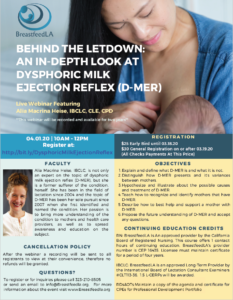Behind The Letdown:
An In-Depth Look At Dysphoric Milk Ejection Reflex

Please join us for a live webinar on Wednesday, April 1, 2020, at 10:00 AM PST for a timely and informative talk about Dysphoric Milk Ejection Reflex with Alia Macrina Heise.
Alia Macrina Heise, IBCLC,
Alia Macrina Heise is not only an expert on the topic of dysphoric milk ejection reflex (D-MER), but she is a former sufferer of the condition, herself. She has been in the field of lactation since 2004 and the topic of D-MER has been her sole pursuit since 2007 when she first identified and named the condition. Her passion is to bring more understanding of the condition to mothers and health care providers, as well as to spread awareness and education on the subject.
Behind The Letdown:
An In-Depth Look At Dysphoric Milk Ejection Reflex
Objectives
- Explain and define what D-MER is and what it is not
- Distinguish how D-MER presents and it’s variances between mothers
- Hypothesize and illustrate about the possible causes and treatment of D-MER
- Teach how to recognize and identify mothers that have D-MER
- Describe how to best help and support a mother with D-MER
- Propose the future understanding of D-MER and accept any questions
Session description
Please join us for a live webinar on Wednesday, April 1, 2020, at 10:00 AM PST for a timely and informative talk about Dysphoric Milk Ejection Reflex with Alia Macrina Heise.
In this 90 minute presentation not only is it discussed how D-MER presents, its tell-tale manifestation, and its spectrum and intensities but also the story behind the discovery of D-MER.
The presentation also explains the currently proposed mechanism of the MER anomaly, how health care providers can identify a mother it D-MER and how to help and support mothers with the condition through clinical practice.
Additionally, in this longer presentation, there is detail about how the idea of emotion concepts may dictate a mother’s emotional experience, how the introspective network of the brain affects the mother’s embodied emotional experience of D-MER and a mother’s relationship with shame during her D-MER experience.
Dysphoric milk ejection reflex (D-MER), is not a new phenomenon. In the past, it was almost like Voldemort, the Problem That Must Not Be Named. But for over 10 years now, it has had a name and been brought into daylight. Though still not widely known or understood by many, the hypothesis of the mechanism and possible sustainable solutions are becoming better documented all the time. D-MER has been the subject of two case studies, one case series, a qualitative research study, and a thesis project. Other studies as also in process at this time.
Mothers with D-MER feel, as a reflexive response with every single milk release, a wave of negative emotions ranging (depending on severity) from homesickness to hopelessness and despair, perhaps even anger and suicidal ideation. These emotions dissipate shortly after milk release and reoccur with the start of every MER, whether with breastfeeding, expressing or with spontaneous releases. Many sufferers keep the problem to themselves preferring the weaning of their baby to being incorrectly labeled as depressed or victims of abuse. Upon experiencing D-MER mothers are initially convinced the problem is physiological and not psychological, and they are correct.
As both a lactation consultant and a sufferer of D-MER, I first named and identified D-MER over 10 years ago. Now, through the case studies that have been done, collaboration with other medical and breastfeeding care providers, and the collection of information from the anecdotal reports from over 1,300 mothers, there is now a foundation of understanding of D-MER. Though the evidence base for the mechanism of D-MER is still mainly unestablished at this time, there are many professionals always working to bring evidence-based information to the study of human lactation. This is exactly what the slow work and understanding of D-MER is about; the process of bringing new information into the light for further research and understanding.
Recording Policy
Attendees of this webinar are not permitted to make personal recordings of the webinar for any purpose. A recording of the webinar will be distributed to you for your own personal use approximately 48 hours after the event ends. By completing the registration process for this event, you agree to this recording policy and consent that you will use the webinar, the recording, and the associated handouts ONLY for your own education and not share them or any photos or screenshots anywhere, including on social media.
Cancellation Policy
After the webinar a recording will be sent to all registrants to view at their convenience, therefore no refunds will be granted
Payment Policy
Payment must be made during the time of online registration using a credit or debit card. If you need to make alternate payment arrangements such as a company check to be mailed to BreastfeedLA, you MUST select the ticket option of “General Registration by Check.” No Early Bird registration rates will apply to payments by check. This policy is in effect as of Aug 1, 2017.
Continuing Education Credits (offered at no additional charge)
RN: BreastfeedLA is an approved provider by the California Board of Registered Nursing. This course offers 1 contact hours of continuing education. BreastfeedLA’s provider number is CEP 16435. Licensee must maintain certificate for a period of four years.
IBCLC: BreastfeedLA is an approved Long-Term Provider by the International Board of Lactation Consultant Examiners #CLT113-36. 1.5 L-CERP will be awarded.
RD: Maintain a copy of the agenda and certificate for CPEs for Professional Development Portfolio.
